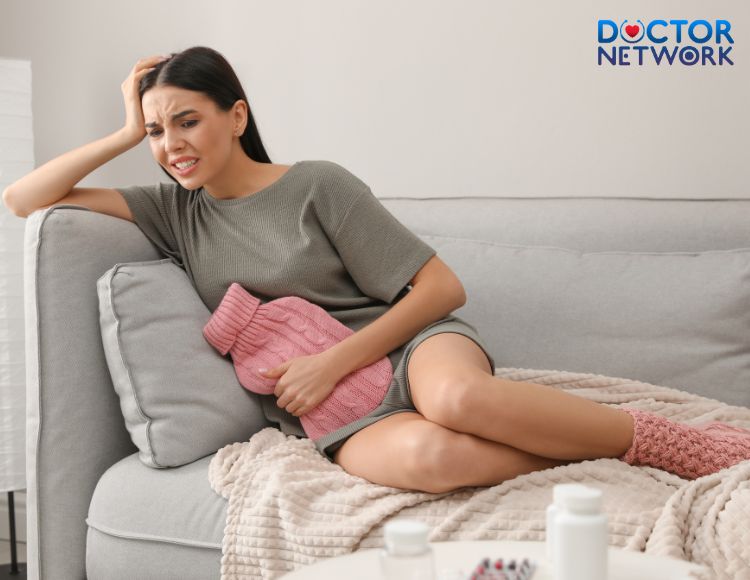Menstrual cramps are a nuisance that many women face every month. To alleviate the pain, many turn to painkillers as a quick solution. However, the question “Is taking painkillers for menstrual cramps harmful?” always causes concern for many. Let’s delve into this issue further.
Painkillers for Menstrual Cramps: Benefits and Harms
The most common painkillers for menstrual cramps are nonsteroidal anti-inflammatory drugs (NSAIDs) like ibuprofen, naproxen, or simple analgesics like acetaminophen. They work by reducing the production of prostaglandins, which cause uterine muscle contractions and lead to pain.
Benefits
- Quickly and effectively reduce menstrual cramps.
- Help women maintain better daily activities and work during their menstrual period.
Potential Harms
- Stomach pain, nausea.
- Long-term or excessive use can impair liver and kidney function.
- Painkillers can mask more serious health conditions that cause menstrual cramps.

Long-term or excessive use can impair liver and kidney function
Long-term Use of Painkillers for Menstrual Cramps and Its Consequences
Is taking painkillers for menstrual cramps harmful? Relying entirely on painkillers for menstrual cramps can lead to:
- Dependence Habit: The effectiveness of painkillers diminishes over time, forcing users to increase the dosage.
- Higher Risk of Side Effects: High doses or long-term use increases the risk of stomach, liver, and kidney damage.
- Is taking painkillers for menstrual cramps harmful? Other Potential Health Risks: Menstrual disorders, masking underlying conditions, making it harder to treat the correct cause.

Is taking painkillers for menstrual cramps harmful? – Masking underlying conditions, making it harder to treat the correct cause.
Alternative Solutions: Safe and Sustainable Menstrual Cramp Relief
To effectively manage menstrual cramps in the long term, women should combine the following methods:
Lifestyle Changes
- Eat a balanced diet, reduce processed foods, and high sugar intake.
- Stay hydrated.
- Exercise and manage stress.
- Maintain a regular sleep schedule.
Physical Therapy
- Apply heat to the lower abdomen.
- Gently massage to relax abdominal muscles.
- Practice yoga or suitable stretching exercises.

Practice yoga or suitable stretching exercises
Herbal Support: Consult with a doctor or healthcare professional about using ginger, chamomile tea, or other supportive herbs to relieve pain.
When to See a Doctor Immediately?
Do not ignore if you experience any of the following:
- Severe menstrual cramps that do not improve with regular medication.
- Irregular menstrual cycles, unusually heavy bleeding.
- Severe abdominal pain accompanied by high fever, vomiting.
- Suspected other gynecological conditions (endometriosis, fibroids…)
Some Questions about “Is Taking Painkillers for Menstrual Cramps Harmful?”
Here are 5 frequently asked questions related to the topic “Is taking painkillers for menstrual cramps harmful?” along with detailed answers:
- Should I take painkillers for menstrual cramps regularly?
It is not recommended to use painkillers for menstrual cramps too frequently. Overuse can lead to dependency, reduced drug effectiveness over time, and increased risk of side effects such as liver, kidney, and stomach damage. Women should prioritize natural pain relief methods and only use medication when absolutely necessary.
- Does taking painkillers for menstrual cramps affect fertility?
Short-term use of painkillers for menstrual cramps usually does not significantly affect fertility. However, prolonged use at high doses can disrupt the menstrual cycle and affect ovulation. If you are planning to conceive, discuss safe pain relief options with your doctor.
- Can taking painkillers for menstrual cramps cause infertility?
There is no research proving a direct link between taking painkillers for menstrual cramps and infertility. However, some causes of severe menstrual cramps (such as endometriosis, uterine fibroids…) may also affect fertility. A medical examination is needed to find the correct cause.
- Are severe menstrual cramps caused by taking painkillers?
Severe pain can have many causes, and taking painkillers is only a minor factor. Prolonged severe pain unresponsive to medication may be a sign of serious gynecological conditions that require timely examination and treatment.
- Are there ways to relieve menstrual cramps without taking medication?
Absolutely! Many methods can help relieve menstrual cramps without medication:
- Apply heat
- Gently massage the abdomen
- Do light exercises such as yoga, stretching
- Drink warm chamomile tea, ginger tea
- Adjust diet and lifestyle to be healthier.
Remember, each body reacts differently. Consult your doctor to develop the safest and most appropriate pain relief method for you!
Some Scientific Evidence about “Is Taking Painkillers for Menstrual Cramps Harmful?”
Here is some scientific evidence about “Is taking painkillers for menstrual cramps harmful?”:
- A study published in the Journal of Global Pharmacology in 2020 found that regular use of NSAIDs increases the risk of peptic ulcers by 2-3 times compared to non-users.
- According to a study published in the Journal of Epidemiology in 2013, women using painkillers for menstrual cramps have twice the risk of developing colitis compared to non-users.
- A 2019 meta-analysis from Harvard Medical School found that high-dose, long-term use of NSAIDs increases the risk of acute kidney injury by 10%.
- A study published in the Journal of Liver in 2016 indicated that women using high-dose acetaminophen have twice the risk of liver damage compared to those using low doses.
- According to the National Institute of Child Health and Human Development’s 2018 study, regular use of NSAIDs can alter ovulation timing, affecting fertility.
- A study published in the Journal of Obstetrics and Gynecology in 2012 found that women using painkillers for menstrual cramps have a higher risk of menstrual cycle disorders compared to non-users.
Is taking painkillers for menstrual cramps harmful? While taking painkillers for menstrual cramps provides immediate relief, it also carries potential harms. Especially, overuse of painkillers can affect health. To safely and effectively manage menstrual cramps, you need to seek the correct cause, apply natural pain relief methods, and use medication appropriately if necessary.
References:
https://www.ncbi.nlm.nih.gov/pmc/articles/PMC3890944/
https://www.ncbi.nlm.nih.gov/pmc/articles/PMC8935669/
https://www.sciencedirect.com/science/article/abs/pii/S0953620515000813
Kiểm Duyệt Nội Dung
More than 10 years of marketing communications experience in the medical and health field.
Successfully deployed marketing communication activities, content development and social networking channels for hospital partners, clinics, doctors and medical professionals across the country.
More than 6 years of experience in organizing and producing leading prestigious medical programs in Vietnam, in collaboration with Ho Chi Minh City Television (HTV). Typical programs include Nhật Ký Blouse Trắng, Bác Sĩ Nói Gì, Alo Bác Sĩ Nghe, Nhật Ký Hạnh Phúc, Vui Khỏe Cùng Con, Bác Sỹ Mẹ, v.v.
Comprehensive cooperation with hundreds of hospitals and clinics, thousands of doctors and medical experts to join hands in building a medical content and service platform on the Doctor Network application.

























